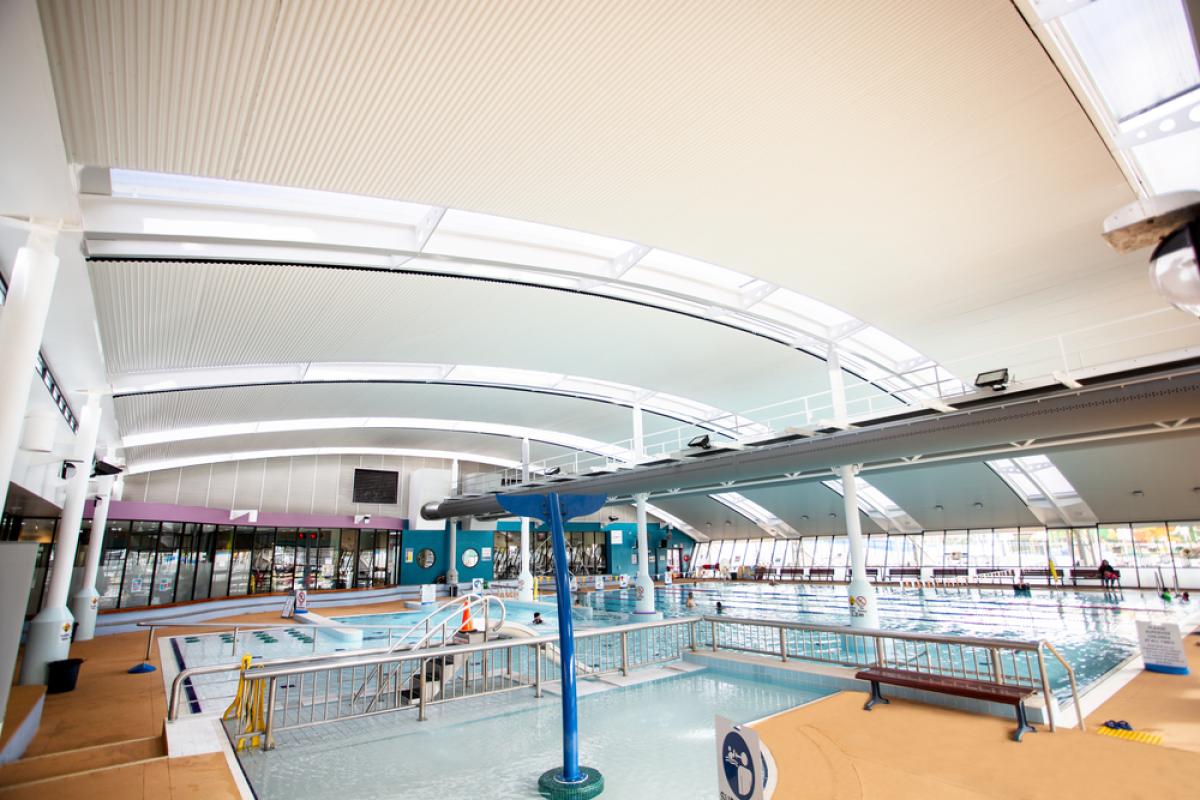Aquatic centres and indoor pools are popular recreational facilities that offer a host of health and leisure benefits to communities. However, due to their unique environments, they are subject to corrosive elements that can pose significant challenges to their design and construction. In this article, we will explore the corrosive elements that must be considered when planning and building aquatic centres and indoor pools. Finally, we will consider the attributes of PERMALITE® aluminium cladding and structural products, which have proven to be an effective and durable solution to combat corrosion-related issues in such facilities.
Corrosive elements in water treatment and storage facilities
When designing and building aquatic centres and indoor pools, several corrosive elements specific to the pool environment need to be considered. The presence of water, chemicals, high humidity, and constant exposure to moisture can significantly impact the materials and structures. Here are some of the key corrosive elements to consider:
- Chlorine and Chemicals
Aquatic centres and indoor pools require the use of disinfectants, primarily chlorine, to maintain water hygiene. Chlorine and other pool chemicals, when present in high concentrations, can be corrosive to materials. They can accelerate the corrosion of metals, including steel, if appropriate precautions are not taken. - Moisture and Humidity
Indoor pools and aquatic centres are characterized by high levels of moisture and humidity. The constant exposure to moisture can promote corrosion on unprotected surfaces, particularly metals, if not adequately managed. - Chloramine Formation
Chloramines are formed when chlorine reacts with organic compounds such as sweat, urine, or body oils in the pool water. Chloramines can lead to corrosion and deterioration of materials. They are particularly aggressive to metal surfaces, such as pool fixtures and equipment. - High Salt Concentration
Some aquatic centres or indoor pools may utilise saltwater chlorination systems. These systems use salt to generate chlorine. While saltwater chlorination is considered less corrosive than traditional chlorine systems, the elevated salt concentration can still impact metal surfaces if not appropriately addressed. - Airborne Chlorine and Chloramine
In indoor pool environments, the airborne chlorine and chloramine particles can settle on surfaces and contribute to corrosion. The salt-laden air and mist from the pool water can carry corrosive particles that can deliquesce and create a corrosive environment.
The PERMALITE® advantage
PERMALITE® cladding and structural products have proven to be effective material solutions in aquatic centres and indoor pools for several reasons:
- Corrosion Resistance
PERMALITE® products are manufactured from marine grade aluminium alloys, such as 5052 and 5251, specifically engineered to withstand corrosive environments, including chlorine and other pool chemicals found in aquatic facilities. These alloys contain higher levels of corrosion-resistant elements like chromium and magnesium, forming a protective oxide layer on the aluminium surface. This barrier prevents chemicals and moisture from directly contacting the metal, ensuring superior corrosion resistance and prolonging the service life of the PERMALITE® cladding and structural products. - Durability
PERMALITE® aluminium products exhibit exceptional durability and can withstand the harsh conditions in aquatic centres and indoor pool environments. It can resist the corrosive effects of pool water, chemicals, and high humidity levels. - Lightweight
PERMALITE® aluminium is significantly lighter than alternate building materials like steel and concrete. This lightweight characteristic simplifies transportation, handling, and installation processes, potentially resulting in cost savings during construction. - Design Flexibility
PERMALITE® cladding is available in a range of both traditional and contemporary profiles enabling designs with a modern and stylish appearance that meet the specific local requirements of aquatic centres and indoor pools. PERMALITE® products are available in various finishes and colours, providing architects and builders with design flexibility to create visually appealing and durable facades. - Low Maintenance
The corrosion-resistant properties of PERMALITE® aluminium mean cladding and structural elements require minimal maintenance in pool environments. PERMALITE® is resistant to staining, fading, and degradation caused by exposure to water, chemicals, and high humidity. - Eco-friendly and sustainable
PERMALITE® aluminium products are an environmentally friendly material choice. It is highly recyclable, and opting for PERMALITE® in building construction aligns with sustainable practices, contributing to reduced environmental impact and promoting a circular economy.
Designing and building aquatic centres and indoor pools require careful consideration of the corrosive elements present in these unique environments. Corrosion can compromise the structural integrity of facilities, posing safety risks and increasing maintenance expenses.
PERMALITE® aluminium cladding, rainwater and structural products offer a reliable and effective solution to combat corrosion in aquatic centres. Their exceptional corrosion resistance, durability, lightweight nature, low maintenance requirements, and aesthetic appeal make them an ideal choice for such facilities.
By incorporating PERMALITE® aluminium products into the design and construction of aquatic centres and indoor pools, facility owners can ensure safer, more durable, and visually appealing facilities for the enjoyment of communities and patrons alike.
